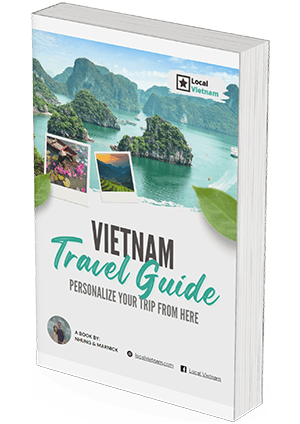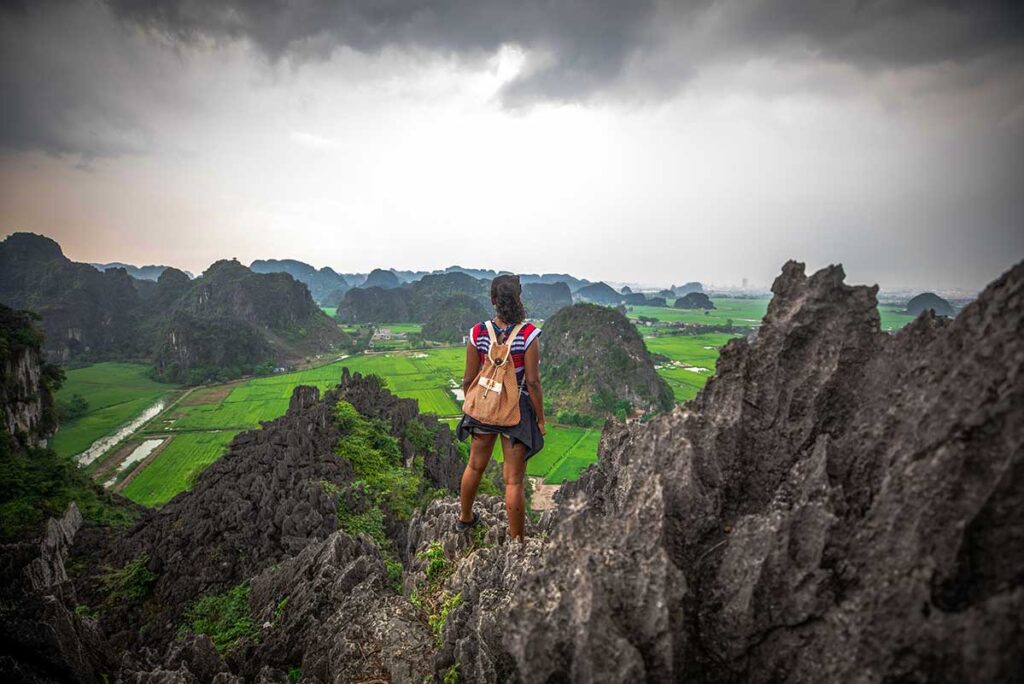Ethnic groups of Vietnam
Vietnam is home to 54 recognized ethnic groups, each contributing to the country’s incredible cultural diversity. These groups are spread across Vietnam, from the rice paddies of the Red River Delta to the remote highlands. The Dao people, one of the larger ethnic minorities, are particularly prominent in the mountainous provinces of the North, such as Ha Giang, Lao Cai, and Yen Bai.
The Dao stand out for their distinctive clothing, spiritual practices, and close-knit communities. They share the highlands with other groups like the Hmong and Tay but have carved out their unique cultural identity over centuries.
Who are the Dao People
Origins of the Dao
The Dao people are believed to have originated from Southern China, migrating to Vietnam centuries ago. Their rich history is intertwined with their nomadic roots and their adaptation to the rugged terrains of the Vietnamese highlands.
Where Do the Dao Live in Vietnam?
The Dao are predominantly found in Northern Vietnam, particularly in provinces like Ha Giang, Lao Cai, Cao Bang, and Lai Chau. They typically inhabit high-altitude villages, often surrounded by terraced rice fields and lush forests.
Subgroups of the Dao
The Dao ethnic group comprises several subgroups, each with its own distinct traditions and attire. Some of the most prominent include:
- Red Dao: Known for their bright red headscarves and elaborate embroidery.
- White Dao: Recognizable by their white turbans and simpler clothing.
- Black Dao: Distinguished by their darker clothing, often adorned with intricate patterns.
Unique aspects of the Dao ethnic group
Traditional Clothing
One of the most striking aspects of Dao culture is their traditional clothing. Red Dao women, in particular, are famous for their vibrant red headscarves and intricate embroidery that often features patterns inspired by nature. Their clothing is not just for show; it represents status, identity, and cultural pride.
- Men’s attire: Typically simpler, with dark indigo garments, sometimes accented with embroidered details.
- Women’s attire: Includes tunics, pants, headscarves, and jewelry, with unique patterns that vary by subgroup.
Spiritual Beliefs and Practices
The Dao have a deep spiritual connection, with practices influenced by Taoism. Ancestral worship plays a central role in their daily lives, and their rituals often involve shamanic ceremonies to honor ancestors or seek blessings for health and prosperity.
- Sacred texts: Dao families often keep ancient Taoist scriptures, which are passed down through generations.
- Shamans: Key figures in Dao villages, conducting rituals and acting as healers.
Architecture
Dao homes are traditionally built from wood or bamboo, designed to suit their mountainous environment. These houses are often stilted structures, providing protection against flooding and wild animals.
- Interiors: Homes typically have a central altar for ancestor worship and a communal space for family gatherings.
- Adaptability: The designs vary slightly depending on the subgroup and local environment.
Craftsmanship
The Dao people are skilled artisans, especially known for their embroidered textiles and herbal medicine. They often use natural dyes to create vibrant patterns on fabrics, and their traditional herbal baths are a unique aspect of their culture.
- Embroidery: Passed down from mother to daughter, with patterns that symbolize myths, legends, and nature.
- Herbal medicine: The Dao are renowned for their traditional remedies, especially their therapeutic baths, which are popular with visitors.
Language and Music
The Dao speak languages that belong to the Mienic group, which is distinct from Vietnamese. Music is an integral part of their cultural expression, with traditional instruments like bamboo flutes and drums used during ceremonies and celebrations.
Best activities to experience Dao culture
1. Trekking Through Dao Villages
Embark on guided treks through the mountainous regions where Dao communities reside, such as Sapa, Ha Giang, or Cao Bang. These treks take you through breathtaking landscapes of terraced rice fields and lush forests, offering a glimpse into the everyday life of the Dao people.
- Highlights: Meet locals, observe traditional farming practices, and visit vibrant markets.
- Recommendation: Engage with a local Dao guide for a deeper cultural connection and stories about their heritage.
Read here our guide about trekking in Sapa.
2. Homestay Experiences
Staying with a Dao family offers an intimate way to immerse yourself in their culture. Experience their hospitality as you share meals, learn about their customs, and take part in daily activities. (Also read: What is a homestay?)
- What to expect: Basic but cozy accommodations, traditional home-cooked meals, and plenty of storytelling.
- Best regions: Villages around Sapa and Ha Giang offer authentic homestay opportunities.
3. Participate in a Red Dao Herbal Bath
One of the most unique and relaxing experiences with the Dao people is their herbal bath tradition. These baths use a mix of local herbs, boiled and steeped to create therapeutic baths that soothe muscles and improve circulation.
- Where to try: Sapa is famous for Red Dao herbal baths, offered in local homestays or dedicated bathhouses.
- Why it’s special: The herbal recipes have been passed down for generations and are highly regarded for their medicinal properties.
4. Learn Traditional Embroidery
The intricate embroidery of the Dao people is a cornerstone of their culture. Join a workshop or spend time with local women to learn their embroidery techniques, from selecting natural dyes to creating symbolic patterns.
- What you’ll learn: The meaning behind different patterns and hands-on stitching skills.
- Takeaway: Create your own embroidered keepsake or purchase finished pieces directly from artisans.
5. Shop for Handcrafted Souvenirs
Support the Dao community by purchasing their handcrafted items, such as textiles, scarves, and silver jewelry. These items not only make unique souvenirs but also help sustain the livelihoods of local artisans.
- What to look for: Authentic Red Dao embroidery, handmade bags, and traditional herbal remedies.
- Pro tip: Visit village markets like Bac Ha or Coc Ly for the best selection.
6. Join Seasonal Festivals
If your visit coincides with a local Dao festival, take the opportunity to participate. Celebrations often include traditional music, dances, and rituals that reflect the Dao’s rich spiritual beliefs.
- Festival highlight: The Fire Dance Festival, held by some Dao subgroups, showcases incredible feats of bravery as participants dance barefoot on hot coals to demonstrate their spiritual strength.
Tips for Respectfully Exploring Dao Culture
Be Mindful of Their Lifestyle
The Dao people have a traditional way of life deeply rooted in their connection to nature and community. While visiting their villages, show appreciation for their simplicity and customs, even if they differ from what you’re used to.
Ask Before Taking Photos
The vibrant clothing and cultural practices of the Dao people are incredibly photogenic. However, always ask for permission before taking close-up photos or portraits, as some Dao individuals may be shy or view photography differently.
Respect Spiritual Practices
Dao culture is rich in spiritual traditions. If you visit shrines, altars, or participate in ceremonies, be respectful and follow the lead of your hosts. Avoid touching sacred items unless invited to do so.
Tread Lightly
When exploring Dao villages or trekking through rice fields, stay on designated paths and avoid stepping on crops. The rice fields are their main source of livelihood and require significant effort to cultivate.
Engage with Curiosity, Not Judgment
The Dao people might have traditions or lifestyles that seem unfamiliar or even surprising. Approach these differences with an open mind and genuine interest, asking questions to learn more instead of making assumptions.
Support Local Artisans
When shopping for souvenirs, choose items directly from Dao artisans or community-based markets. This not only ensures authenticity but also helps sustain their traditional crafts and economy.
Dress Modestly
Out of respect for their conservative culture, avoid wearing revealing or inappropriate clothing when visiting Dao communities. This shows that you value their norms and traditions.
Learn a Few Phrases
While the Dao people may speak limited Vietnamese or English, learning a few simple phrases in Vietnamese or Dao dialects (if taught by a guide) can go a long way in building rapport and showing respect.
Participate with Enthusiasm
Whether it’s joining a herbal bath, sharing a family meal, or learning embroidery, immerse yourself fully in the experience. Your willingness to participate is often met with warmth and appreciation.


